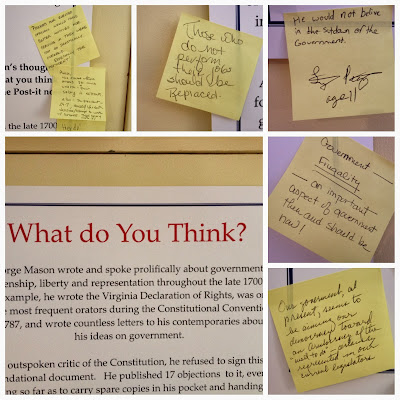By Lacey Villiva
Education Manager
 Halloween approaches. This evening millions of children across America will be donning costumes, grabbing bags and buckets, and ringing doorbells to the sound of “Trick or Treat.” Thoughts niggle in some parents’, or even kids’, brains: What was Halloween like in the past? Some of the participants in the recent Halloween at Gunston event may have been wondering what it was like for the children that lived in that home.
Halloween approaches. This evening millions of children across America will be donning costumes, grabbing bags and buckets, and ringing doorbells to the sound of “Trick or Treat.” Thoughts niggle in some parents’, or even kids’, brains: What was Halloween like in the past? Some of the participants in the recent Halloween at Gunston event may have been wondering what it was like for the children that lived in that home. Halloween as we imagine it today is a product of the middle and the end of the 19th century with increasing numbers of Irish immigrants. To really understand that phenomenon, however, one must step much farther back in history. The essence of Halloween can be traced back to ancient pagan religions, particularly the Celtic festival of Samhain (pronounced sow-en). This festival heralded the new year for the Celtic peoples, and a time when the skin between the worlds of the living and the dead were at their thinnest. Parts of the festivities included celebrating the end of the harvest, costumes, bonfires and honoring the dead.
With the advent of Christianity, these celebrations changed. Pope Greogry III altered the existing All Martyrs Day, on November 1st, to include all Saints as well. This day was sometimes referred to as All Hallow’s Day, and the preceding day was given the moniker All Hallow’s Evening. The name was eventually shortened to the modern Halloween. The celebration was a fairly solemn affair.
 By the 18th century, and in the American colonies, the appearance of Halloween was scattered. It was much more common in the Southern colonies and Maryland, than in the northern, Puritan colonies. Fortune Telling, ghost stories and harvest festivals were also prevalent throughout 18th century history, and not purely limited to one day.
By the 18th century, and in the American colonies, the appearance of Halloween was scattered. It was much more common in the Southern colonies and Maryland, than in the northern, Puritan colonies. Fortune Telling, ghost stories and harvest festivals were also prevalent throughout 18th century history, and not purely limited to one day. It is hard to say whether or not the Masons of Gunston Hall celebrated Halloween in some way, if at all. They left no written records of the practice. No doubt they would celebrate a good harvest. And Mason clearly commemorated the dead with the moving eulogy he inscribed in the family bible for his wife Ann Eilbeck. Mason, himself, died in October 1792, so no doubt there were funereal practices honoring his death at the end of the month that year.
Sources
Gunston Hall Gazette, October 2008.
"Ancient Origins of Halloween," History.com, accessed October 30, 2013.
Theobald, Mary Miley, "Some Pumpkins! Halloween and Pumpkins in Colonial America," Colonial Williamsburg, history.org, accessed, October 30, 2013.








